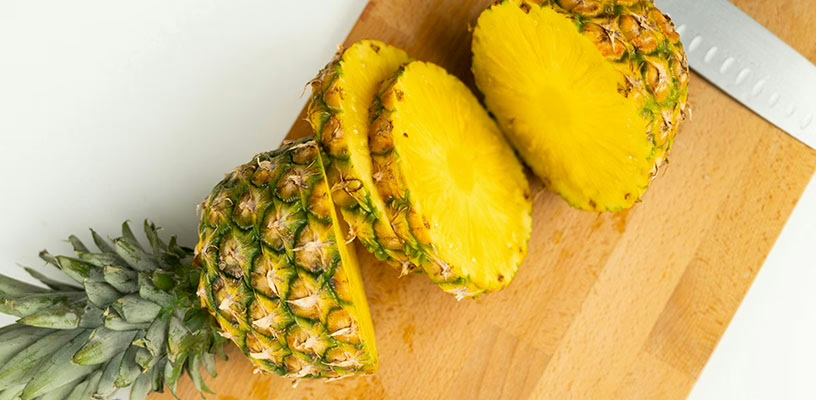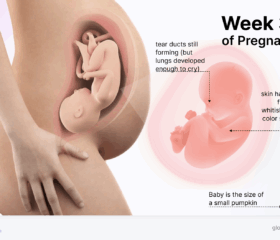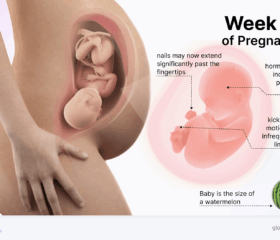Can Pineapple Actually Kickstart Labor? The Truth About This Myth
If you like piña coladas (virgin, of course!) and getting caught in the rain, you might have heard about the old wives' tale that pineapple can induce labor.

Maybe you’re ready for your baby to come already and that sounds like a good thing—or maybe you’re worried about accidentally inducing a preterm birth and it sounds like the opposite. Either way, it makes sense if you’re wondering whether there’s any truth to this story.
Let’s dive into the science behind all the pineapple talk.
How is pineapple supposed to induce labor?
The supposed secret behind this alleged natural method of inducing labor has to do with an enzyme called bromelain. It’s the culprit that causes that itchy or tingly feeling you get after eating pineapple—because it breaks down the proteins in your saliva that protect your mouth, tongue, and throat from the pineapple’s acid, causing irritation. 1
Following that logic, some people believe that bromelain can soften or thin the cervix, which is a process known as effacement (one of the classic signs of labor). The belief is that the bromelain can break down the proteins in the cervix’s tissue to prepare it for childbirth.
Is there any scientific evidence that pineapple induces labor?
What does the science say on this topic? Very little, actually. It probably isn’t true that pineapples can induce labor, but the truth is, we don’t know for sure.
In more detail, here’s what you need to know:
The research on this is limited
While everyone and their mother may swear by pineapples as a natural labor aid, the truth is that there’s still not enough solid research on it.
Some studies have shown that bromelain can cause uterine contractions, but they’ve generally involved applying the enzyme directly to the uterine muscle in rats and humans without testing what happens when people just eat it. 2 3
Compounding the difficulty, even if scientists discovered that eating pineapple could stimulate contractions, that doesn’t necessarily mean that it would induce labor. After all, if you’ve ever experienced Braxton Hicks contractions (which are also called “practice contractions” and “false labor”), then you know that spasms don’t always mean that your baby’s coming.
Why is there so little research on pineapple and labor induction?
It’s hard to conduct human trials on novel methods of inducing labor without risking compromising the safety of expecting mothers and their babies.
Researchers like to play it safe, and this isn’t a particularly high-priority field of study (it isn’t like there’s an epidemic of pineapple-induced childbirths), so it isn’t a very well-studied area, at least right now.
Is eating pineapple while you’re pregnant a good idea?
What does all of this mean for you? Although more research is needed, in the balance, it’s unlikely that eating pineapples will induce labor (or miscarriage, fortunately).
The evidence for pineapple’s purported effects just isn’t very strong. Moreover, a single pineapple doesn’t contain all that much bromelain. Doctors generally list pineapple as a safe food to eat when you’re pregnant. 4 For better or for worse, doing so probably won’t bring your baby around early.
Don’t take bromelain supplements without talking to your doctor
If you’re desperate to induce labor, you might think you’ve found a cheat code by opting for bromelain tablets instead of actual fruits, but this isn’t a good idea. When you’re pregnant (and even when you aren’t!), you shouldn’t start taking new supplements without talking to your doctor. Moreover, bromelain supplementation comes with risks—it may stop your blood from clotting, which can be dangerous for pregnant women.
Why are there so many anecdotal stories about pineapple inducing labor?
You might have heard from loved ones and coworkers—and even that one neighbour down the street—about how pineapple can help you induce labor. These stories are interesting, but be careful of confusing correlation with causation.
If a lot of women eat pineapple late in their pregnancies hoping it will bring their babies along, many of them will, in fact, go into labor. That doesn’t mean the pineapple caused it. In many cases, labor was due to happen regardless.
Pineapple is still a healthy choice during pregnancy
Even though pineapple probably won’t induce labor, it’s still great to eat anyway (pregnant or not). It’s rich in several key nutrients, including:
- Vitamin C: Just one cup of pineapple covers your daily vitamin C needs. This antioxidant can help repair damaged skin and improve its texture. 5 During pregnancy, vitamin C can also help you fight off infections and colds now that your immune system is suppressed and support your baby’s bone, teeth and blood vessel development. 6
- Manganese: This mineral helps your body absorb calcium, form blood clots, build bones, process carbohydrates, fats and sugar, and boost your normal brain and nerve function. Just one cup of pineapple covers your recommended daily amount. 7
- Folate: Pineapples are a good source of folate (B-9), which your baby needs to develop his brain, spine and nerves. It can also reduce the risk of your baby developing birth defects. 8
If you’ve started experiencing heartburn during your pregnancy, pineapples can also ease your symptoms. You can eat a little after your meals to calm your digestive system and reduce the risk of acid reflux. 9
Watch out for allergies
With all of that said, it’s worth noting that if you have a Type 1 (immediate sensitivity) latex allergy, you might also be allergic to pineapple. This is due to latex-food syndrome which triggers an immune response from your body because the proteins in both latex and pineapple have very similar structures.
If you have this condition, you might also be allergic to other fruits and vegetables: 10
- Avocado
- Banana
- Kiwi
- Tomato
- Papaya
- Passion fruit
- Peach
- Mango
- Lettuce
If you eat any of these and experience stomach aches, vomiting, red raised rashes (hives), swelling, or a tingling or itchy feeling in your mouth and lips, you could be having an anaphylactic reaction and should seek medical care immediately.
Final thoughts
If you’re overdue or just fed up with this nine-month rollercoaster, it may be tempting to try anything that might speed things up.
Unfortunately, as we mentioned, there’s just not enough concrete evidence pointing to pineapple as an effective way of doing that. Instead, have a conversation with your doctor or midwife about what options are best for you and your baby.
On the other hand, if you’re reading this because you love pineapple and want to know if it’s safe, rest assured, pineapple is a healthy (and delicious!) fruit that you can enjoy in moderation throughout your pregnancy.
Article Sources
- Annals of Allergy, Asthma & Immunology. "The many flavors of pineapple reactions" Retrieved April 16, 2025.
- Journal of Ethnopharmacology. "Investigation of uterotonic properties of Ananas comosus extracts" Retrieved April 16, 2025.
- ResearchGate. "In Vitro Investigation of Fresh Juices of Ripe Ananas Comosus (Pineapple), Carica Papaya (Pawpaw) and Citrullus Vulgaris (Water Melon) for Uterine Contractile Properties in Non-Pregnant Rats" Retrieved April 16, 2025.
- Onslow County, NC. "Your Pregnancy Guide" Retrieved April 16, 2025.
- Medical News Today. "Everything you need to know about pineapple" Retrieved April 16, 2025.
- REAN Foundation. "Vitamin C: The Vital Vitamin for Safe Pregnancy" Retrieved April 16, 2025.
- Cleveland Clinic. "The Many Health Benefits of Pineapple" Retrieved April 16, 2025.
- Pregnancy, Birth and Baby. "Folate and pregnancy" Retrieved April 16, 2025.
- Intermountain Health. "Pregnancy Heartburn? 7 Ways to Get Relief" Retrieved April 16, 2025.
- Allergy. ""Latex-fruit syndrome": frequency of cross-reacting IgE antibodies" Retrieved April 16, 2025.







